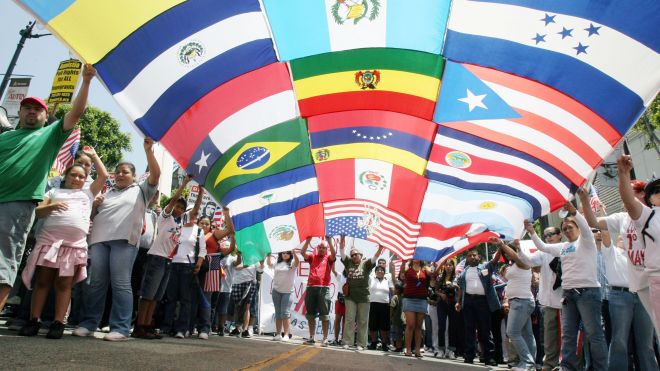How Anti-Latino Rhetoric Hurts All Americans

This is what we've been saying all along. Anti-Latino rhetoric hurts all Americans.
By Belinda Campos and Leo R. Chavez, Greater Good Magazine (10.5-minute read) 
We all want to be valued members of the groups to which we belong. For Latinos in the United States, this isn’t easy. Rhetoric that casts Latinos as a threat to other Americans is a fact of life.
Do words matter? To Latinos? To all Americans?
In a study that started last summer, we learned that anti-immigrant and anti-Latino rhetoric can leave psychological damage in its wake. But the findings also point to a pathway for undoing that damage, by the simple act of bringing attention to a group’s positive contributions and membership in the larger group. If we can replace hateful rhetoric with language that is positive and inclusive, we won’t just help Latinos feel good about themselves. We’ll also help to build a stronger United States.
Seeing Latinos as a threat
Some may be tempted to think that anti-Latino rhetoric is a new phenomenon, a product of changes to the political discourse that first appeared during the presidential campaign in 2015 and 2016. That would be wrong. The history is much longer. During the era of the Great Depression, for example, people who looked “Mexican”—including U.S. citizens—were deported to Mexico as a way to reduce competition for scarce jobs or conserve poverty relief funds for people deemed more deserving. In Los Angeles alone, these actions cut the Latino population by one-third.
That’s the history Donald Trump tapped into when he began his campaign on June 16, 2015, by calling Mexican immigrants drug dealers, criminals, and rapists. But Trump did not stop with immigrants, going on to target Americans with Mexican heritage. In a highly publicized attack on Judge Gonzalo Curiel that members of his own political party called “the textbook definition of a racist comment,” Donald Trump questioned the Judge’s ability to perform his job—overseeing a lawsuit involving Trump himself—because his parents had been born in Mexico. Trump’s attack on Curiel, an American citizen by birth in the United States, was an attack on all Americans of Mexican descent.
Far from punishing this anti-Latino rhetoric, significant numbers of Americans voted for Donald Trump—and today he is president of the United States.
Trump isn’t alone, of course. Earlier this year, Iowa congressman Steve King suggested that Latino children are a threat to the nation’s future: “Culture and demographics are our destiny. We can’t restore our civilization with somebody else’s babies.” This rhetoric drew a clear distinction between “us” (legitimate members of the nation) versus “them” (those who don’t belong) that casts Latinos as “other” who cannot be Americans.
Though it’s not possible to establish a causal link between this rhetoric and real-world violence, it is probably not an accident that hate crimes in nine U.S. cities rose more than 23 percent in 2016, according to a study by criminal justice professor Brian Levin at California State University, San Bernardino.

